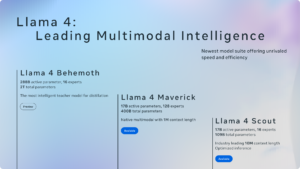Meta AI’s Potential as a Stalwart Advertising Tool

Meta’s AI Assistant Update
Introduction to Personalization
Meta, the parent company of Facebook and Instagram, recently announced an enhancement to its AI-powered assistant. This update focuses on personalizing responses by utilizing user data and shared information from both platforms. This means more tailored interactions for users based on what they share and their preferences over time.
Key Features of the Update
One of the standout features of the upgraded Meta AI is the ability to create "memories." This capability allows the AI to remember specific details that users provide, which can then influence its responses in future interactions. For example, if a user informs the assistant about their vegan lifestyle, it can suggest breakfast recipes that align with that dietary choice later on.
Benefits of Personalized Responses
- Tailored Interactions: The assistant can give responses that reflect the user’s specific preferences and interests.
- Improved User Experience: By remembering user details, the AI creates a more engaging and beneficial experience.
- Enhanced Relevance: This feature helps users receive suggestions that are directly applicable to their lives, such as meal planning or product recommendations.
The Competitive Landscape
As we look to the future, it’s clear that tech companies are racing to develop personalized AI agents. By 2025, numerous firms aim to leverage such technology to enhance efficiencies for both consumers and businesses. For Meta, having an AI assistant capable of accessing user data can also serve as a powerful marketing tool.
Advertising Opportunities
Meta’s AI upgrade has the potential to become a critical platform for advertising. Some key points regarding this are:
- Integration of Advertisements: With personalized AI agents, companies like Meta can target specific audiences with tailored advertisements.
- Contextual Ad Targeting: The memories feature means the AI can deliver ads based on explicit preferences expressed by users.
Challenges and Regulations
While the update presents exciting opportunities for Meta, there are challenges to consider. Regulatory measures, especially in Europe, make it increasingly difficult for platforms to utilize personal data for advertising purposes. As such, the ability for users to share their own information becomes crucial for relevant ad targeting.
Broader Implications of AI in Advertising
The evolution of AI is affecting how various tech companies approach advertising. Other leading firms, like OpenAI, are also contemplating ways to integrate ads into their generative AI models. This trend indicates a broader shift in how digital platforms might seek to monetize their technologies amid rising operational costs.
Commercial Viability of AI Tools
- Personalized Tools: As companies develop more personalized AI tools, they create further avenues for monetization through targeted ads.
- User Engagement: Engaging users with responses that consider their history and preferences can lead to higher satisfaction rates and increased interaction with ads.
Meta’s Future Strategy
Meta’s recent product updates emphasize the company’s commitment to leveraging AI not just for enhanced user interaction, but also for advertising revenue generation. By doing this, they aim to counteract trends of diminishing user engagement on platforms like Facebook while creating new revenue opportunities through innovative solutions.
With features that allow for complex understanding of consumer preferences, Meta AI’s personalized responses can streamline the way users interact with brands and advertisements, ultimately creating a win-win scenario for both users and marketers.





